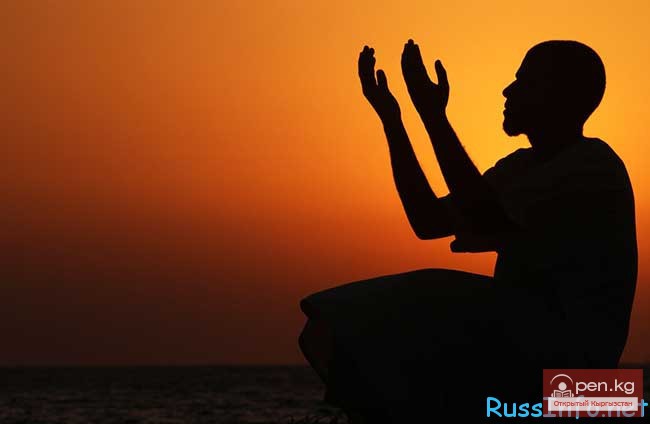Schedule for the month of Ramadan. Dates for calculating the holiday. Eid al-Fitr in a Muslim family.
The ninth month of the Muslim calendar is called Ramadan or Ramadan, and it is sacred, since, according to legend, it was in this month that the angel Jibril conveyed the first divine revelation to the Prophet Muhammad. At this time, the Prophet Muhammad lived in a cave near Mecca, where he performed religious ceremonies. It was the first revelation received by the prophet that became the basis holy book Islam - Koran. In Turkic languages, Ramadan is most often called Uraza and Saum.
The month of Ramadan lasts from 29 to 30 days, depending on the lunar calendar. And since the lunar calendar is shorter than the Gregorian calendar, every year the month of Ramadan moves back by about 11 days. Moreover, in different Muslim countries, Ramadan can begin at different times, and this depends on the method of astronomical calculation or direct observation of the phases of the Moon.
In 2016, Ramadan in most Muslim countries begins on June 11 and ends on July 10. The fast begins at dawn and ends after sunset on the specified day. Before the beginning of each day, when a Muslim believer intends to fast, he must pronounce his intention (niyat) out loud, which indicates that the fast is for the sake of Allah.
Celebrating Ramadan in Moscow
Muslim believers consider Ramadan to be their main duty of the year, because this holy month is accompanied not only by pious behavior and frequent prayers, but also by strict fasting, which is obligatory for all Muslims. First of all, fasting is intended to pacify the soul and body, as well as to accurately fulfill the instructions of Allah.  Muslim mass prayer during Ramadan
Muslim mass prayer during Ramadan
Throughout Ramadan, Muslims must read the Quran, devote their time to pious thoughts and actions, work and charity. In addition, to the usual five prayers a day, one more is added at night.
Rules of Ramadan
- enter into intimate relationships during daylight hours;
- smoking (including hookah and other smoking mixtures);
- swallow liquids that enter the mouth (including water while bathing or brushing teeth);
- take food and water during daylight hours;
- indulge in any entertainment and listen to music loudly.
Who is exempt from fasting?
Only children, travelers, warriors, pregnant women, sick people and old people who are physically unable to fast are exempt from these regulations. But it is obligatory to replace the fast in another, more favorable period.
If a Muslim breaks his fast, he must pay the needy a certain amount in money or give away his sin in food, thus making up for the fast. One of the most serious violations is entering into intimate relationships during daylight hours, for which a Muslim must pay either by 60 days of continuous strict fasting or by feeding 60 poor people.
The last ten days of fasting are especially strict and responsible, during which, according to legend, the Prophet Muhammad received his first revelations from an angel. During this period, Muslims pray especially diligently and adhere to the instructions of Allah. It is believed that Allah repays the good deeds done during Ramadan to believers a hundredfold, giving them good luck, prosperity and health.
With the onset of Ramadan, it is customary for Muslims to congratulate each other in words or in the form of postcards, because this particular holiday marks the birth of the holy book the Koran, which plays a special role in the life of every believer.  greeting card for the holiday of Ramadan (Ramadan)
greeting card for the holiday of Ramadan (Ramadan)
Ramadan 2016: schedule, when it starts, rules and essence of fasting. Ramadan is a holy fast that lasts for a month for Muslims. This is a time of spiritual purification, which is revealed by the Holy Quran.
Ramadan 2016: schedule, when it starts, rules and essence of fasting. This year, the first day of this holy fast will be June 6, and the last day will be July 4, after which the holiday of Eid al-Fitr or Eid al-Fitr will begin. The month of Ramadan is the most important month of the year. It lasts from 29 to 30 days, depending on the lunar calendar.
Ramadan 2016: schedule, when it begins, rules and essence of fasting. In Islam, with the help of fasting, believers strive to get closer to Allah Almighty by pacifying the soul and body and following the instructions of Allah. During fasting, a person refuses to commit everything forbidden: negative emotions, sex, smoking, alcohol, eating and drinking at certain times of the day. The fast begins early in the morning at dawn and ends after sunset. Meals during Ramadan are taken twice at night and once in the evening. During fasting, you need to pray a lot according to a schedule. 

Ramadan 2016: schedule, when it begins, rules and essence of fasting. Sick people, children, pregnant and nursing mothers, warriors and old people are exempt from fasting - in general, those categories of Muslims who cannot bear the full burden of fasting. If during fasting a Muslim violates the rules of Ramadan, then he must atone for his offenses with money, which he must give to the needy. Intimacy is considered the most serious violation during Ramadan. In case of this violation, a Muslim must feed 60 poor people or fast for 60 days to atone for this sin. The last 10 days of fasting are considered the strictest. At this time, Muslims pray especially fervently and observe all the rules of fasting.
Ramadan 2016: schedule, when it starts, rules and essence of fasting. The most important night in the month of Ramadan is Laylat al-Qadr or the Night of Power and Destiny. According to legend, it was on this night that the Quran was handed over to the Prophet Muhammad. This year, the night of predestination will fall from July 1 to July 2.
Ramadan 2016: schedule, when it begins, rules and essence of fasting. Ramadan ends with the holiday of Breaking the Fast, which occurs on the last day of fasting. This is a day of reconciliation, friendship and love. The holiday begins at the time of evening prayer. On this day, they pay the obligatory zakat al-fitr or “alms of breaking the fast,” congratulate each other and wish the Almighty to accept fasting, and visit relatives and friends.
The month of Ramadan 2016 beginning and end. Schedule and calendar in Russia (Moscow, Ufa, Kazan, Astana). Fasting time for Ramadan for Muslims. For Muslims all over the planet, the holy month called “Ramadan” began.
When does Ramadan start in 2016?
In 2016, the beginning of Ramadan begins on the night of June 5-6. Thus, the first day of fasting is June 6, 2016. The month of Ramadan will last less than 29 days. On July 5, at sunset, the month of Shawwal will begin, and Muslims around the world will celebrate one of the two greatest Muslim holidays - Eid al-Fitr (Uraza Bayram, Eid al-Fitr), Eid al-Fitr will be on September 13, 2016.- Start: June 6, 2016;
- End: July 4, 2016;
- Holiday: July 5 (Uraza Bayram - day of breaking the fast).
Ramadan prayer schedule by city
During Lent:1. Finish eating 20 minutes before. until the time of Fajr;
2. MAGHRIB time - you can start eating. The following schedule is sorted by city, All times indicated in Moscow. If your city is not on the list, write its name in the comments (and we will add it to this page), or just go by the Moscow schedule.
General information about Ramadan 2016
During this month, good deeds performed are considered the most important. Taking into account the sayings of the Prophet Muhammad, Allah will increase the significance of each of your good deeds 700 times. Given the advent of Ramadan, the tourist regime in Muslim countries is changing. For example, state institutions will switch to a reduced work schedule, and a Ramadan menu will be introduced on the planes of some airlines. Tourists are advised to respect the rules and traditions of Ramadan as much as possible, otherwise they may end up in prison (or worse)... In Ingushetia during holy month prohibit the sale and, especially, consumption of alcohol. Violators will be subject to fines.Persons exempt from fasting
- Pregnant and postpartum women, women during menstruation;
- Breastfeeding women who fear for their health and the health of their child;
- Travelers who are far from their home;
- Elderly people, if they do not have enough strength to fast or are seriously ill. This category is obliged to give alms daily (in the amount of the daily food requirement for 1 beggar). However, if their condition improves, they are obliged to fast on a general basis.
- Niyat is the intention to fast for the sake of Allah;
- Abstain from eating, smoking and sexual intercourse from the beginning of morning prayer until sunset.
Muslim holiday Ramadan is celebrated on the 9th month in Islamic calendar. This celebration is a kind of fast that believers must adhere to throughout the month. In addition to fasting, Muslims pray fervently. A special tradition of this celebration is the fact that the reading of prayers should be carried out from the very early morning until sunset. Muslims reserve for this holiday important, there is not a single believer who does not follow the basics and customs of this event.
When is Ramadan in 2016? Main event Muslim life in the specified period, it begins on June 6, and the end of the holiday is indicated on July 5. During this period of time, believers are allowed to eat food only after dark; the entire day is reserved for prayers and self-improvement of the soul. Among the people, this event also has other names, for example, scorching or burning. After the end of Ramadan, the Muslim world celebrates a cheerful and cheerful holiday - Eid al-Fitr.
The month of Ramadan in 2016 is very similar to Orthodox fasting before Easter. Both events are connected with the fact that a person goes through appropriate trials, limits himself to his usual diet, and compares himself with God. The result is internal self-improvement and awareness of the importance of life. In Orthodoxy, after the end of strict fasting, a bright and cheerful Easter is celebrated. And in the Islamic faith, after the month of Ramadan, a similar fun event is celebrated - Eid al-Fitr.
Rules of Ramadan
At the moment, it is known exactly what date Ramadan is in 2016. Muslims will observe a kind of fast on June 6th. But in order to correctly comply with all the necessary requirements, you need to strictly comply with the rules of the festive event.- IN daytime or after sunrise, believers are strictly forbidden to eat any food, as well as consume various liquids. After sunset, these restrictions are lifted.
- During the time the sun is in the sky, you cannot engage in sexual activity. This basis is the main one in observing this fast. Indulging in lovemaking is allowed only after dark.
- If during the day, while washing or bathing, a Muslim accidentally swallows water, then such a circumstance is not considered a violation of the rules of Ramadan. The only exception to this circumstance is that the water was consumed intentionally.
- When Ramadan arrives, the holiday schedule should concern almost every person of the Islamic faith. This exception includes people with mental disabilities, as well as children who have not yet reached puberty.
- All pregnant or breastfeeding women are allowed not to follow the rules of this most important event in the Islamic faith, and all travelers and sick people are also allowed not to fast. But if during the duration of the holiday all these restrictions are lifted from a person, then he should follow the basics of Ramadan from the corresponding day.
- In cases where mentally ill or old people adhere to fasting, they are allowed to eat food during the day only if their physiological state of health requires it.

Punishment for non-compliance with Ramadan rules
The date of Ramadan 2016 is determined by 1 month, during which time the believer is advised to follow the most important principles and rules of the holiday. For the fact that a person does not comply with the necessary requirements, he is due a kind of punishment.Dates for calculating the holiday
The beginning and end of Ramadan 2016 is determined by lunar calendar. As a rule, the celebration begins on the first day after the arrival of the new moon. In 2016, this date will occur on June 6.The beginning of the celebration varies significantly from year to year. In some countries, astronomical calculations of the holiday take place, other states determine the beginning of the specified event by Gregorian calendar, many Muslim countries calculate the arrival of the event of the year according to the lunar calendar. It is precisely because of different calculations in different states that the holiday begins at different times.
The purpose and basis of the holiday
In some countries, the worldview of humanity is structured in such a way that there is constant opposition to something in the hearts of the people. Such peoples respect wars, active actions and contradictions. In particular, we are talking about Muslim countries, whose people from early childhood have a craving for confrontation in their souls. But in the souls of hot-tempered people there must necessarily come a period of time when their emotional state should be calm and peaceful. This period of time is considered to be the month of Ramadan.Fasting for Ramadan helps the Islamic people find peace and peace of mind. This time should be completely devoted to silence, tranquility and repentance. As mentioned earlier, the duration of the holiday is 1 month. During all this time, a believer must sacredly observe the rules of the most important event of the year. It is very important that for this period a person completely renounces all litigation, adversity, troubles and problems. As a result, a person must necessarily come to the understanding that he has come as close as possible to sacred images.

The main tradition of the celebration is prayer. It should be read almost all the time the sun is shining in the sky. It is imperative to read the prayer words immediately after waking up, as well as before going to bed. Prayer words help a person to realize what is important to him in life, which way he wants to move further along the lines of fate. In the case when evil and good are fighting in the soul of a believer, then with the help of prayer he is able to strengthen the positive qualities in the soul.
The Muslim holiday of Ramadan in 2016 involves a corresponding hunger strike, which helps a person realize that food is not the main thing in life. During the holiday, it is important to give up carnal desires and various human passions.



















